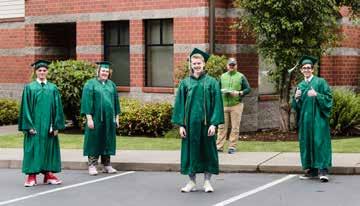
14 minute read
Faith, Hope, and Love in the College Journey
BY RYAN SUMMERS
INTRODUCTION
Greetings and thanks to the Board of Trustees, Bear Creek administrators, faculty and staff, alumni, parents, relatives, and friends. And, congratulations, Class of 2020! In the next 12 minutes I want to try to show you how you will need faith, hope, and love in your college journey.
FAITH AS VISION
When I make salsa, I tearfully chop the onion first. But later the tomato, cilantro, pepper, and lime come along and everything gets fragrant and tangy. The first three minutes of this address are the onion—hopefully the tangy fragrance will come by the end.
explained to me or nothing. And reason is impotent when it hears this cry from the heart. The world itself, whose single meaning I don’t understand, is but a vast irrationality. If one could only just say: ‘all is clear’ then all would be saved.”1
That resonates, doesn’t it? We love clarity; in fact, here at Bear Creek we teachers live by the motto “predictable and supportive.” The problem that Camus points out is that we can’t say “all is clear,” and we more often find ourselves saying with him, “I don’t understand.” When a genius like Camus says that “human reason is impotent” and that the world “is but a vast irrationality,” we have something to be concerned about.
The more recent existentialist work The Hitchhiker’s Guide to the Galaxy by Douglas Adams makes a

similar point by depicting a group of pan-dimensional, hyper-intelligent beings2 who design a supercomputer named Deep Thought. They want to know once and for all “the answer to the ultimate question of life, the universe, and everything.” So they ask Deep Thought, and it processes for 7.5 million years. The answer it gives to the ultimate question of life, the universe, and everything is, wait for it…42. Adams wants us to see that figuring out who we are and how we should live isn’t merely a function of processing power—not even geniuses like Malcolm and Nelson could come up with an algorithm that tells you what your identity and purpose are.
Most of what is truly important to human flourishing is, in fact, invisible to the natural human eye and unquantifiable by a calculus of our own making. Severed from transcendence, our sight isn’t clear enough, our wisdom isn’t deep enough for life’s journey. In the next leg of your journey, college, you will experience a perplexing freedom, a freedom that will often feel like a vast jungle expanse of intermingled terrors and delights—many of which will be nearly impossible to distinguish a priori. Which fruit nourishes and which kills? Which snake is harmless and which is the deadliest predator within a hundred miles?3 Which guy is hitting on you and which actually does want to practice his foreign language with a real person?4 They look nearly identical. Imagine being given autonomy and trying to navigate such a wilderness by yourself. The dead reckoning of your human reason and five senses just isn’t going to cut it. You need a guide or…Google Maps for the Soul.
This vexing quest is a tale told in many myths from many cultures—take, for example, one we all know, Odysseus. He’s trying to get home through the ever-changing, vast terrains of land and sea, but getting side-tracked, side-swiped, tempted, betrayed, tangled, transformed, disoriented, shipwrecked, spellbound. Without Athena, he isn’t going to make it. He is not self-sufficient. He’s just a man. It’s all of us. Searching for direction, searching for home.
It is the testimony of human culture that we need something transcendent, something with bigger perspective, something above our own context to be our vision. We don’t need freedom to know the way home; we need faith. Stratford Caldecott suggests: “Faith opens reason to a transcendent horizon; it assures reason [and Camus] that the world as a whole does make sense; it encourages reason to aspire to a greater truth.”5 As Augustine urged us, “believe so that you may understand.” Having eyes is not the same as seeing; and even seeing doesn’t guarantee vision. Faith imparts divine vision to human eyes.6
That was the onion. And the sting was that your raw7 human faculties are outmatched by life’s complexities. So, you need faith to see. Now I want to suggest that you also need hope.
HOPE AS A CALL
In her book Liturgy of the Ordinary, Tish Harrison

Liam M. ’20, Finn J. ’20, Matthew J. ’20, and Brandon K. ’20
Audrey W. ’20, Lauren E. ’20, and Josie W. ’20

Warren asks readers to imagine what it would be like if travelers forgot their telos, their final goal, their destination? What if we decided that this vast jungle expanse is all we’ve got, and just settled down, popped up a tent and started hunting for dinner? What if we said this trail is “all that is or was or ever will be.”8 That would be like Odysseus hopelessly staying on that enchanted isle, prisoner to Calypso, and never returning to Penelope or Ithaka. He must sail for home; in fact, the gods order him to do so.9 Hope says that we are a people “on the way.” Hope allows us not to expect permanent fulfillment from temporary pleasures.10 Hope is what benevolently keeps us from being completely satisfied by that new girlfriend, those straight As, or that Seattle internship. Hope politely reminds us that our tents won’t last forever.11
To that end, God has not left us without pointers, reminders, signs, and prompts that our paths are meant to lead us somewhere. There is within all of us a hopeful witness of transcendence, and that witness often gets activated or tripped by the goodness, grace, and beauty of the material creation. In fact, all things here can be evidences of transcendence since speckled, and seeded this world with signs of hope,13 trail-markers along the way, which call up homesickness14 in our souls. Let me
give some specific examples.
For some of us, it’s art that reminds us of our telos. Aren’t there certain paintings, statues, buildings, photos, and songs that stir up in you a desire for another time and place? They seem like portals through which imagination can access something beyond, somewhere you want to be. C.S. Lewis makes this point by having Edmund, Lucy, and Eustace get pulled into Narnia and on to Prince Caspian’s boat, the Dawn Treader, through a painting. The kids are transported from Harold and Alberta Scrubb’s back room to the transcendent homeland of the true king, through art.15 Or take food: certain tastes or smells arouse a metaphysical appetite even as they satisfy a bodily one—if anyone wants to celebrate the transcendent call of carnitas nachos afterward, let me know. Or what about the beauty of nature? The smell of the forest, the lapping surf of the beach, lazy snowflakes loitering under a streetlight.
Think of these material realities as church bells16—calling you to come and adore, come and worship, come and meet with the sacred transcendent. And when you follow the church bells and find them, you realize the bells aren’t the thing you’re looking for. They’re just the reminders, the prompts. You are led through them, not to them. If you expect from the bells what you get from the God of the bells, you only ever experience the temporary pleasures of sight and sound, and your soul’s longing will remain unmet.
God is calling us to journey to Himself, and He guides us through his lavish and mysterious gifts of material reality.17 Those calls stir up a hope that can lead us along our telos. The red-wing blackbird by the pond, the Monet print up in your dorm room, John Mayer’s Stratocaster18 at midnight, the bacon-double cheese burger—they are signals of hope that can direct you to the transcendent as you journey.
Emily F. ’20

LOVE AS GUIDE
Here’s what I’ve suggested in parts one and two. We are teleological creatures, who sense a transcendent purpose in our lives and connecting with the source of that transcendence is like going on a journey. On that odyssey we need faith to focus our vision, and we need hope to follow the church bells of food, nature, and art that direct us to transcendence. Faith and hope give us direction to a telos greater than 42.
But we need one more thing. You see, faith can be like opening your eyes while swimming in a lake. It’s hard to know for sure what you’re always seeing. And hope, likewise, can ghost you like a student during a remotelearning English class. Signed in for attendance, sure enough, but with the mic muted and the camera off all you can see are those glowing blue initials. Could there possibly be something greater than faith and hope for your journey?
And the answer is yes! Of faith, hope, and love— love is the greatest, St. Paul tells us.19 Love is so essential to our lives that all of our souls are desperately belting out the Foreigner lyrics, “I want to know what love is. I want you to show me.”20 And that cry of our hearts is evidence that we were made to be loved—our craving shows the existence of a possible satisfaction. Our inability to find that possible satisfaction here in this realm points us to find it in Someone beyond this realm.21 But how can we know Someone beyond this realm, when we are still in this realm? Unless he came here? Isn’t that what Love would do: go and 18
The Christian story says that Transcendent Love became a local who grew up in our landscape, walked the trails of our journey, and knows what it’s like to sweat with anxiety, to get pricked by a thorn, to get a stitch in his side, to get bitten
by a snake.22 And
because He came from the transcendent place and has eyes and ears for the things of His homeland, He can remind us daily of the glory of our destination. He knows the terrain and the telos of the journey firsthand. What would you give to have a guide who is a gentle, empathic local servant,23 one who is as you now are, and also one who is a wise, authoritative transcendent Prince,24 one who is as
you will
one day be?25 Then we would know what love is; we would have seen it and heard it. What Good News! Then, as Camus said, “All would be saved!”
Christianity affirms that Christ is that Servant Prince, who is two natures in one Person, Love Incarnate, the Transcendent made flesh, come to lead His people home. “This is how God showed His love among us: He sent his one and only Son into the world that we might live through Him” (1 John 4:9). This is the Good Word: that Love has come and the Servant Prince wants to walk with you now and forever.
Seniors, your journey of the next four years will no doubt contain surprises and trials, exhilarations and setbacks. Would you consider putting your faith in the Transcendent One for vision, tuning in to His calls of hope for direction, and grasping the hand of Love Himself for companionship—because if God himself is for you, who can prevail against you?26
Mr. Summers joined the Upper School faculty in 2015 and teaches Honors Senior English and AP Literature and Composition. He was selected by the senior class as the Class of 2020 Commencement speaker. His passion is learning with students and discussing the great ideas in the great books. When not exploring worldview or talking about literature, he can probably be found in the Fitness Center training with the Bear Creek athletes. He holds a B.A. English and a M.Ed. Curriculum and Instruction, both from Penn State.
1 From his 1955 essay “An Absurd Reasoning” in The Myth of Sisyphus.
2 These beings project a three-dimensional form here on earth as mice.
3 I’m thinking here of how difficult it would be in the jungle to know what’s edible and what’s dangerous, but I’m also trying to connect that with the idea of Eden (the pre-fall garden/jungle) and the idea that our freedom, even in pristine nature, doesn’t lead to flourishing: we eat the wrong fruit and don’t always recognize our true friends or enemies.
4 In high school, I joined the Spanish club because I wanted to have more time with a certain young lady. In the yearbook, you can see me in the Spanish club picture, standing right next to her. Que Bueno!
5 From Beauty in the Word: Rethinking the Foundations of Education.
6 2 Corinthians 5:6 – 7, “We know that while we are at home in the body we are away from the Lord, for we walk by faith, not by sight.”
7 I was really pleased with this pun on the salsa metaphor.
8 Carl Sagan’s famous summation of the cosmos.
9 That’s from book V, where Odysseus is stranded on Ogygia. The gods send Hermes to tell Calypso to let him go home. We might think Odysseus would be happy living on a mythical island with a beautiful nymph who loves him, but Odysseus knows he’s not doing what he’s made to do—he’s missing his telos as a king, father, and husband. Arduous travelling, and not resigned hedonism, is his call.
10 I’m paraphrasing some ideas from James K.A. Smith’s On the Road with Saint Augustine here: “The heart’s hunger is infinite, which is why it will ultimately be disappointed with anything merely finite. Humans are those creatures who can never be fully satisfied by anything created.”
11 2 Corinthians 5:1 – 4 : “For we know that if the tent that is our earthly home is destroyed, we have a building from God, a house not made with hands, eternal in the heavens. For in this tent we groan, longing to put on our heavenly dwelling, if indeed by putting it on we may not be found naked. For while we are still in this tent, we groan, being burdened—not that we would be unclothed, but that we would be further clothed, so that what is mortal may be swallowed up by life.”
12 James Corkery talks about this sacramental view of “every created reality… being a bearer of transcendence” in his essay, “Detectives of Grace in the Adventures of Scholarship.”
13 My verbs are inspired by Gerard Manley Hopkins’s “Pied Beauty”: “Glory be to God for dappled things… all things counter, original, spare, strange… fickle, freckled.” For “He fathers-forth whose beauty is past change: Praise him.”
14 G.K. Chesterton: “The modern philosopher had told me again and again that I was in the right place, and I had still felt depressed even in acquiescence. But I had heard that I was in the wrong place, and my soul sang for joy, like a bird in spring… I knew now… why I could feel homesick at home.”
15 Lewis illustrates the inadequacy of a materialistic worldview by having Eustace nearly drown as the children enter the waters of Narnia through the painting. Eustace’s disbelief in myth and fairy tale results in his not being equipped to live in an enchanted land.
16 I got the image of seeing creation as full of church bells from Tish Harrison Warren.
17 James 1:17: “Every good gift and every perfect gift is from above, coming down from the Father of lights, with whom there is no variation or shadow due to change.”
18 Fender actually makes a John Mayer signature model strat.
19 1 Corinthians 13:13: “And now these three remain: faith, hope and love. But the greatest of these is love.”
20 From their 1984 release Agent Provocateur. The song’s 293,940,131 plays on Spotify are a testimony to its cultural resonance.
21 This is Lewis again, from Mere Christianity.
22 I’m doubling the imagery here to reflect the journey metaphor but also the very physical pain Christ endured at Gethsemane and Golgotha, ultimately crushing the head of the serpent who stung him.
23 Isaiah 52:13 – 15, Christ as suffering servant.
24 Isaiah 9:6: “For to us a child is born, to us a son is given, and the government will be on his shoulders. And he will be called Wonderful Counselor, Mighty God, Everlasting Father, Prince of Peace.”
25 1 John 3:2: “We know that when he appears we shall be like him, because we shall see him as he is.”
26 Romans 8:31 – 35: “What then shall we say to these things? If God is for us, who can be against us? He who did not spare his own Son but gave him up for us all, how will he not also with him graciously give us all things? Who shall bring any charge against God’s elect? It is God who justifies. Who is to condemn? Christ Jesus is the one who died—more than that, who was raised—who is at the right hand of God, who indeed is interceding for us. Who shall separate us from the love of Christ? Shall tribulation, or distress, or persecution, or famine, or nakedness, or danger, or sword?”










